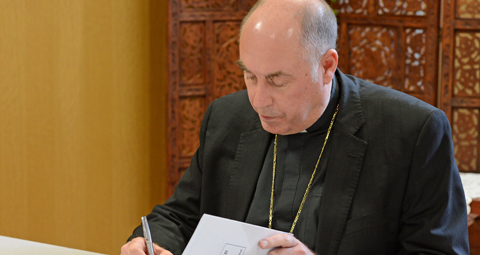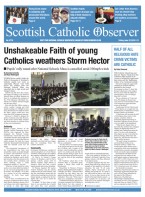BY Daniel Harkins | June 8 | ![]() 0 COMMENTS
0 COMMENTS ![]() print
print

Church partners with police and Scottish Government to combat human trafficking
The Catholic Church has partnered with the police and the Scottish Government to combat human trafficking in Scotland.
On Monday June 4, Bishop Brian McGee of Argyll and the Isles Diocese met with cabinet secretary for justice Michael Matheson and Police Scotland at the Scottish Crime Campus in Gartcosh to discuss the issue.
Bishop McGee had been invited to the meeting by interim Police Scotland chief constable Ian Livingstone after the men met through the Santa Marta group, a Vatican-backed initiative that brings the Church and police around the world together to combat human trafficking. The bishop said Mr Matheson—who sought out the meeting after being made aware of the bishop’s presence at the Crime Campus—was keen to work with the Church to combat the issue.
There were 213 reports of suspected human trafficking in Scotland in 2017, up 42 per cent on the previous year. The figures followed the launch of a national strategy by the Scottish Government to increase reporting of suspected cases. 58 per cent of human trafficking reports from 2017 involved a male victim, both adults and children, 85 per cent of which were victims of labour exploitation.
Bishop McGee told the meeting that many of the victims are coming from countries where the police are corrupt, and where ‘the only people they trust are the Church—the ‘first place they go to rather than the police’ and the ‘one place they identify with safety.’
Bishop McGee told the police that the Church has a ‘duty to help people form their conscience,’ and that this and parish networks can help combat human trafficking.
“One thing the Church can do domestically is to influence the choices people make, for example to get them to think about the nail bar or car wash and ask why it so cheap compared to the one around the corner,” the bishop said. “But also, people are trafficked because they are living in poverty or war—that is one thing government can have an influence on. The Church can influence people’s conscience, but governments can make decisions that can bring peace and alleviate poverty. I am impressed with what the government is doing, but they can also consider these implications. Human trafficking exists because the place of origin is poverty and war, and the place of destination is greed. We need to tackle both of these.”
“You might not normally think of the police and Church working together in a secular country,” he added, “but that is exactly what is happening, and happening across the world.”
Every parish in Scotland will have received a letter recently on human trafficking as part of the Church’s Day for Life, and Bishop McGee said he has agreed to keep in contact with the police to see how they can deepen the relationship.
Following the meeting, Michael Matheson said: “I welcomed the opportunity to discuss the issue of human trafficking with Bishop McGee and the chance to explore ways to work together to tackle this issue. The Scottish Government has made significant progress to raise awareness of trafficking and encourage the reporting of concerns.
“From April 1, Scotland set its statutory support period for trafficking victims at 90 days—double the previous support period. Eliminating human trafficking is a key priority for the Scottish Government and partners and we will continue to build on existing networks and consider new ways to share good practice and increase awareness.”
Detective superintendent Stuart Houston of Police Scotland’s human trafficking unit said: “People are often trafficked across international borders but they can also be trafficked within and around Scotland and the UK. Eliminating all forms of trafficking and exploitation and protecting people from harm continues to be one of Police Scotland’s top priorities. However, we cannot do this alone. It is vitally important to build links and work with partners internationally, nationally and locally to tackle trafficking.
“Our meeting with the Bishop of Argyll and the Isles was about raising awareness of trafficking across all Scotland’s communities. Local communities are best placed to identify whether someone may be trafficked or is being exploited. By raising public awareness and understanding of the signs of trafficking, Police Scotland and its partners hope to identify when people may have been trafficked and tackle those who choose to exploit people for their own gain.”
Last week, the Church in England launched a new app which people can use to report suspected human trafficking at car washes.











